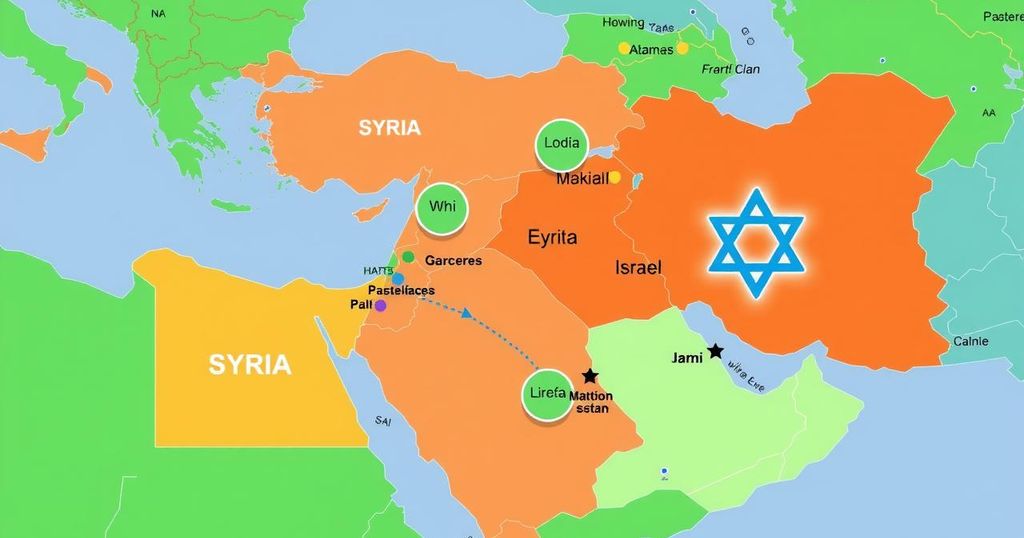Following Bashar al-Assad’s ousting in December, Prime Minister Netanyahu views opportunities for Israel to reshape its influence in Syria, potentially leading to territorial expansion and strategic alliances with minority groups. Military operations have intensified as Israel seeks to mitigate threats from the new leadership. Regional dynamics are further complicated by actions from countries like Turkey, Saudi Arabia, and Russia, each vying for influence amidst the chaos.
In December, following the ousting of Syrian leader Bashar al-Assad, Israeli Prime Minister Benjamin Netanyahu recognized potential opportunities for Israel amidst the chaos in Syria. He envisages a Middle East realigned to Israel’s favor through advancements in Syria, which may include the division of the nation into smaller, autonomous regions. Israeli Foreign Minister Gideon Sa’ar asserted that stability in Syria relies on federalism that respects diverse populations.
Since the conflict sparked by Hamas on October 7, Netanyahu has emphasized transforming the region to Israel’s advantage, viewing recent changes in Syria as beneficial. He is now taking strategic steps to strengthen territorial claims and influence by seeking alliances with various minority groups throughout Syria. In light of Assad’s regime’s decline, Israeli ground forces have aggressively involved themselves deeper in Syrian territory, abandoning previous doctrines of non-confrontation.
Israel’s occupation has blurred the borders drawn since the 1967 war, and the shifting geopolitical landscape encourages further gains in southern Syria. Since Assad’s administration provided key supply routes for Iran and its militant proxies, Israel’s recent military actions have involved significant airstrikes against the remnants of Assad’s forces. Israel categorically rejects any deployment of Syrian troops along its borders, which they perceive as direct threats.
After Assad’s removal, Ahmed al-Sharaa has become Syria’s new leader, seeking to distance himself from extremism while navigating tumultuous relations with Israel. Israeli officials have conveyed their intent to maintain a presence in Syria indefinitely, expressing commitment to protect the Druze and Kurdish populations from extremist threats. Israeli Defense Minister Israel Katz condemned Sharaa’s deceitful portrayal, revealing him to be a dangerous former jihadist.
Israel’s attempts to maintain influence extend to protecting the Druze community, traditionally a minority in Syria, against potential persecution from the new regime. Netanyahu’s administration has prepared militarily to support the Druze, as they express fear of future oppression. Historical grievances complicate Israel’s overtures, with factions among the Druze community hesitant about Israeli intentions and some embracing the protection offered due to fears of Sharaa’s regime.
In conjunction, Israel considers Syria’s Kurdish forces as strategic allies against potential Turkish aggression. Such alliances may face backlash from broader Syrian unity desires, as attempts to divide communities could backfire. Additionally, Turkey has signaled intentions to establish military presence using Sharaa’s implicit approval, contrasting Israel’s overt ambitions.
Regional players, including Saudi Arabia and Russia, are also maneuvering to secure their interests within Syria’s evolving context. The Saudi crown prince recently extended diplomatic recognition towards Sharaa, showcasing a shift in regional dynamics. Russia’s strategic foothold appears weakened, and Israel’s efforts seem geared towards ensuring continued limited influence through necessary diplomatic channels. Netanyahu affirmed Israel’s unwavering commitment to neutralizing any perceived threats along its border, emphasizing proactive measures to maintain security and influence in the region.
In summary, the recent upheaval in Syria presents both challenges and opportunities for Israel under Prime Minister Netanyahu’s leadership. The potential for territorial gains and enhanced influence has prompted Israel to engage militarily in Syria, particularly concerning minority populations. While navigating complex relationships with regional powers and local groups, Israel’s ambitions are met with skepticism among Syria’s factions. As the geopolitical landscape continues to evolve, Israel remains vigilant in securing its borders and interests in a region rife with instability.
Original Source: www.cnn.com






